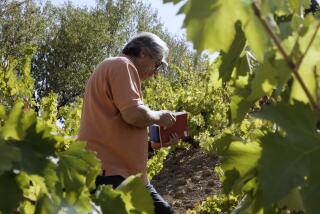A Faith Tested Through 1,700 Years
- Share via
In the year 301, an emaciated man ascended from a stone pit in Armenia, where he had been imprisoned for 13 years for refusing to disavow his Christian faith.
St. Gregory the Illuminator then performed a feat that would alter the nation’s history and forever change the Armenian soul: He healed then-King Tiridat of madness, converted him to Christianity and made Armenia the first nation in the world to officially embrace the light of Christ.
This week, Armenians worldwide kicked off a yearlong celebration of the 1,700-year anniversary of their homeland’s conversion. In the Southland, the central event involved the distribution of a flame, symbolizing the illuminating torch of Christianity, carried here last week from Armenia by Archbishop Vatche Hovsepian, the Burbank-based Western diocese primate of the Armenian Apostolic Church. The flame was lighted by the mother church during a reenactment of St. Gregory’s ascension from the pit, and passed from Hovsepian to Southland priests to congregants over the weekend.
At St. Gregory the Illuminator Church in Pasadena, Father Vazken Movsesian distributed the flame to hundreds of the faithful, who carried candles and oil lamps in a ceremony Sunday replete with the aroma of incense, jangle of bells and soulful singing of ancient hymns.
“Take this light and use it in your lives,” the priest told the packed church. “Be the best person you can be. . . . Become a beacon of light and hope.”
The significance of the moment moved many of the faithful to tears--including Movsesian. In explaining it later, the priest said he thought of the words of John 8:12: “I am the light of the world. He who follows me shall not walk in darkness.”
He thought of the terrible trials visited on the Armenian people over centuries: genocide, wars and earthquakes, invasions and brutal conquests by the Persians, Ottoman Turks and Communists.
And he thought of his church, surviving it all.
“I thought of how many times people have tried to keep us in darkness, but the light kept shining through,” Movsesian said.
Yet as Armenians celebrate what many regard as a miraculous endurance of their faith, some church leaders look uneasily into the future and see a new challenge: a weakening of religious conviction brought on by seven decades of Communist rule back home and by materialism, secularism and assimilation here.
Movsesian calls this the “white massacre.”
“No blood is being spilled, but we’re losing our identity in the big melting pot of America,” he said. “Materialism is killing our people and our community.”
To nearly all Armenians, Christianity has always been an inseparable part of their culture, history and national identity. Their written language, for instance, was developed in the 5th century for the sole purpose of translating the Bible from Greek and Aramaic. During the long centuries of foreign conquest, the church was the leading and often the only institution to represent the people and preserve their Armenian identity.
Here in the United States, the church has served to unite a diaspora community of immigrants from Armenia, Turkey, Lebanon, Iran, the former Soviet Union and other countries. More than a million Armenians reside in the United States, an estimated half of them in California.
The Western diocese oversees 24 churches, including nine in the Southland, with growing flocks outside California in Seattle, Salt Lake City and Las Vegas. Buoyed by an Armenian immigration boom of the last two decades, churches are packed; the archbishop says there is enough demand to start five more if he had the resources.
But Hovsepian acknowledged that, especially for new immigrants who grew up under Communist rule, religion has become “a custom, not a conviction.”
Many come with almost no understanding of the fundamentals of the faith or of church protocol; some, he said, lighted cigarettes in church until they were stopped.
Linda Maxwell, a staff member of We Care for Youth in Glendale, says she has worked with scores of Armenian teenagers who wear crosses but don’t understand the story it represents--including one who reads the Bible daily but still commits crimes of violence because no one has ever shown him how to apply the teachings to his life.
Clinical psychologist Levon Jernazian said the clergy are seen as too distant; he urged them to serve more as friends, counselors and spiritual advisors to what he called the “lost crowd of teens and new immigrants.”
“In many ways I’m compensating for the lack of real spiritual direction that is supposed to be provided by the church,” Jernazian said.
Like the Catholics, church members are facing a clergy crisis: Movsesian estimates that half of the 60 or so priests in America are set to retire in the next decade, and the seminaries are not producing enough candidates to replace them.
Archbishop Hovsepian said the immigration boom overwhelmed the church and forced it to concentrate on overseeing growth and helping newcomers find jobs, housing and social services. Now, he says, a greater focus will be placed on religious services, seminars and education.
Church leaders say the anniversary year gives the church a ripe opportunity to reinvigorate the faith. A slate of events is planned, including pilgrimages to Armenia and a 1,700-mile bus trip to all of the churches in the Western diocese, a scholarly symposium with USC, youth rallies and special concerts.
For his part, Father Movsesian intends to use the anniversary as a way to hammer home the social gospel he believes lies at the core of true Christianity. In his four years here, the priest has worked to nudge the often insular Armenian community to step outside itself. Working largely with his church’s youth, he has organized blood drives, food and toy giveaways for local families and a 30-hour fund-raising fast for the needy in Africa and Mexico.
“We have an obligation as the first Christian nation to speak out against injustice and do everything Christ would do if he were here,” the priest said. “Because we have been so downtrodden, we should be the first people to take the light and shine it on others.”
More to Read
Sign up for Essential California
The most important California stories and recommendations in your inbox every morning.
You may occasionally receive promotional content from the Los Angeles Times.














